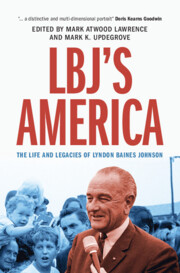Book contents
- LBJ’s America
- LBJ’s America
- Copyright page
- Contents
- Illustrations
- Contributors
- Introduction
- Chapter 1 Power and Purpose: LBJ in the Presidency
- Chapter 2 LBJ and the Contours of American Liberalism
- Chapter 3 Lyndon Johnson and the Transformation of Cold War Conservatism
- Chapter 4 The Great Society and the Beloved Community: Lyndon Johnson, Martin Luther King Jr., and the Partnership That Transformed a Nation
- Chapter 5 Lyndon Johnson, Mexican Americans,and the Border
- Chapter 6 The War on Poverty: How Qualitative Liberalism Prevailed
- Chapter 7 LBJ’s Supreme Court
- Chapter 8 “If I Cannot Get a Whole Loaf, I Will Get What Bread I Can”: LBJ and the Hart–Celler Immigration Act of 1965
- Chapter 9 “It’s Always Hard to Cut Losses”: The Politics of Escalation in Vietnam
- Chapter 10 Lyndon Johnson and the Shifting Global Order
- Chapter 11 “Through a Narrow Glass”: Compassion, Power, and Lyndon Johnson’s Struggle to Make Sense of the Third World
- Afterword: LBJ’s America
- Acknowledgments
- Notes
- Index
Chapter 6 - The War on Poverty: How Qualitative Liberalism Prevailed
Published online by Cambridge University Press: 19 October 2023
- LBJ’s America
- LBJ’s America
- Copyright page
- Contents
- Illustrations
- Contributors
- Introduction
- Chapter 1 Power and Purpose: LBJ in the Presidency
- Chapter 2 LBJ and the Contours of American Liberalism
- Chapter 3 Lyndon Johnson and the Transformation of Cold War Conservatism
- Chapter 4 The Great Society and the Beloved Community: Lyndon Johnson, Martin Luther King Jr., and the Partnership That Transformed a Nation
- Chapter 5 Lyndon Johnson, Mexican Americans,and the Border
- Chapter 6 The War on Poverty: How Qualitative Liberalism Prevailed
- Chapter 7 LBJ’s Supreme Court
- Chapter 8 “If I Cannot Get a Whole Loaf, I Will Get What Bread I Can”: LBJ and the Hart–Celler Immigration Act of 1965
- Chapter 9 “It’s Always Hard to Cut Losses”: The Politics of Escalation in Vietnam
- Chapter 10 Lyndon Johnson and the Shifting Global Order
- Chapter 11 “Through a Narrow Glass”: Compassion, Power, and Lyndon Johnson’s Struggle to Make Sense of the Third World
- Afterword: LBJ’s America
- Acknowledgments
- Notes
- Index
Summary
The War on Poverty was in many ways a political slogan rather than a concrete set of policy initiatives. Often invoked interchangeably with the “Great Society,” it included anti-poverty programs that contributed to America’s patchwork safety net and other initiatives intended to maximize the individual citizen’s ability to realize his or her fullest potential. Conservatives then and later derided the War on Poverty as a failed attempt at economic redistribution that led millions of Americans into a state of permanent dependency on the government, but in truth, LBJ and his aides never seriously contemplated policies that would enforce equality of income, wealth, or condition. They did not broadly support quantitative measures like a guaranteed minimum income or employment. Instead, they believed that qualitative measures like education, workforce training, and access to health care and food security would level the playing field and help poor people realize their share of a growing economy. When economic growth sputtered in the early 1970s, the limitations of these policy decisions became immediately evident. But, considered on its own terms, the War on Poverty proved a lasting and important component of the nation’s response to poverty.
- Type
- Chapter
- Information
- LBJ's AmericaThe Life and Legacies of Lyndon Baines Johnson, pp. 146 - 170Publisher: Cambridge University PressPrint publication year: 2023



